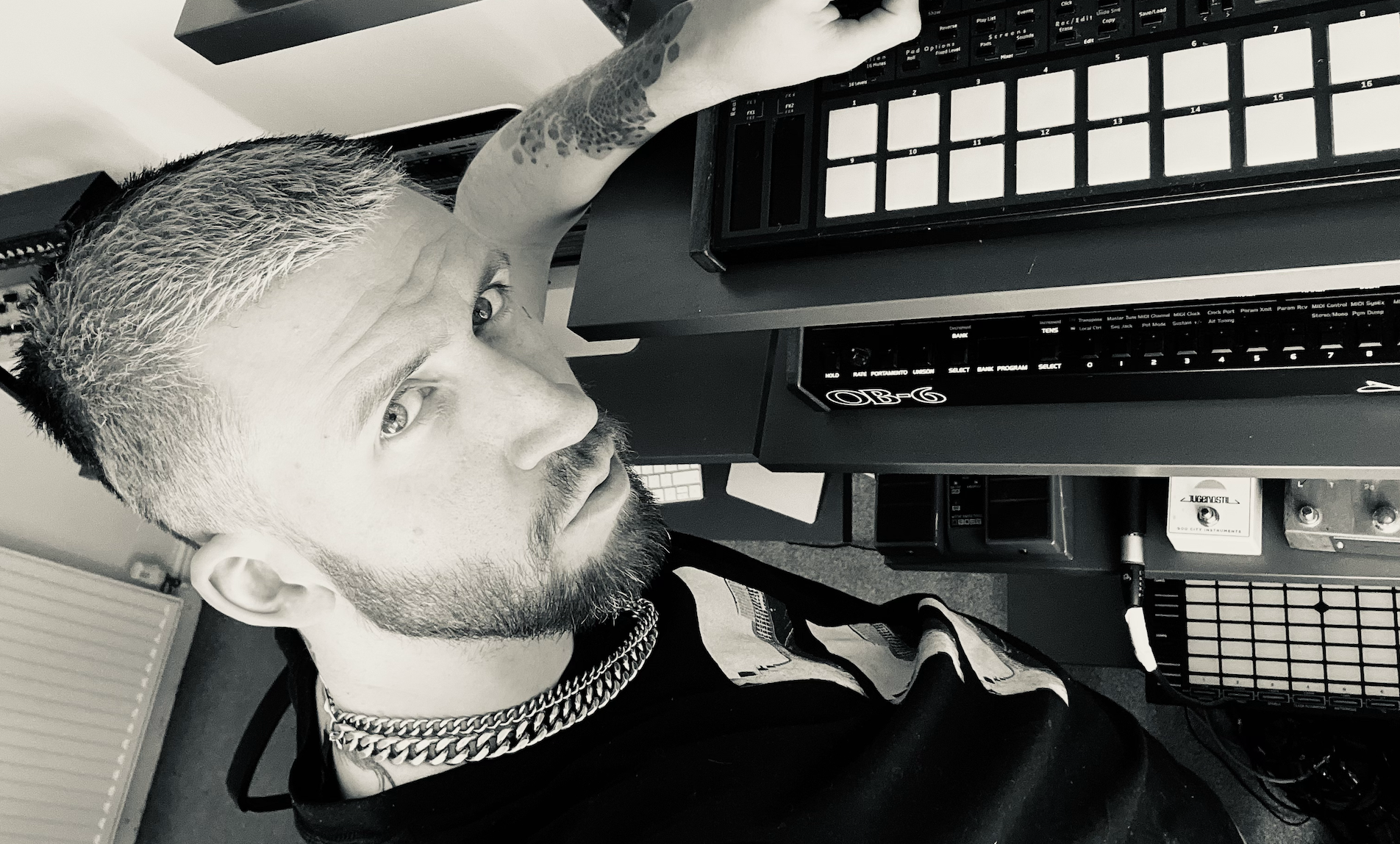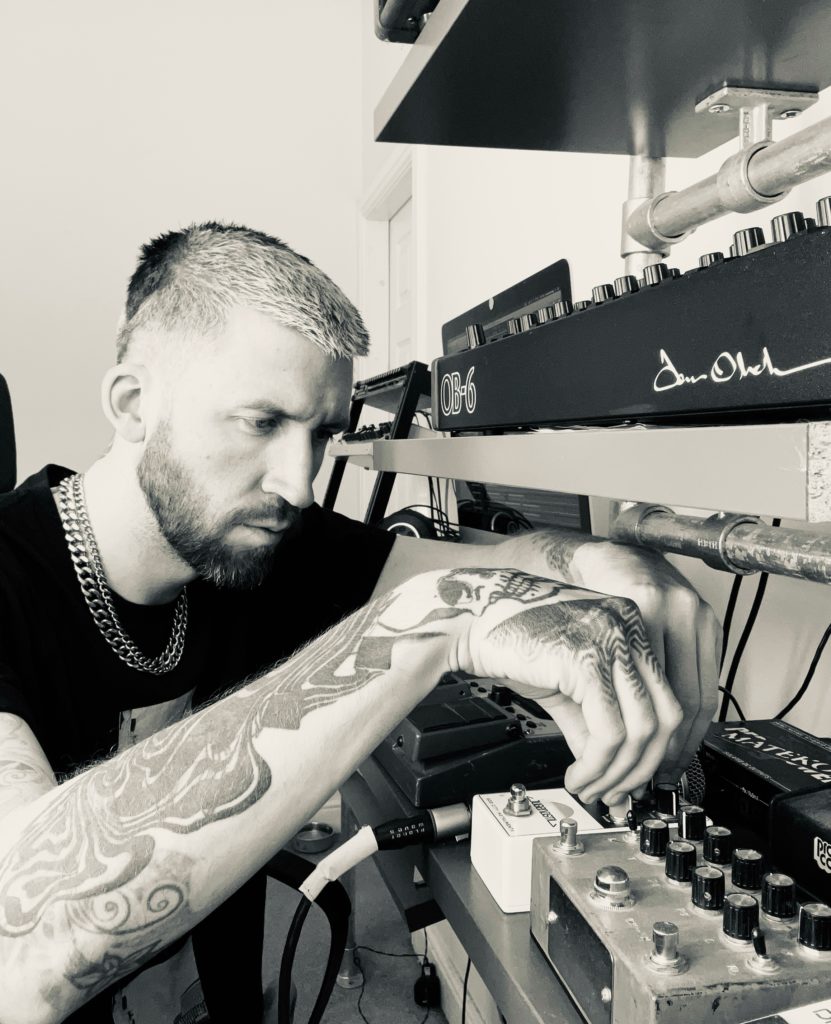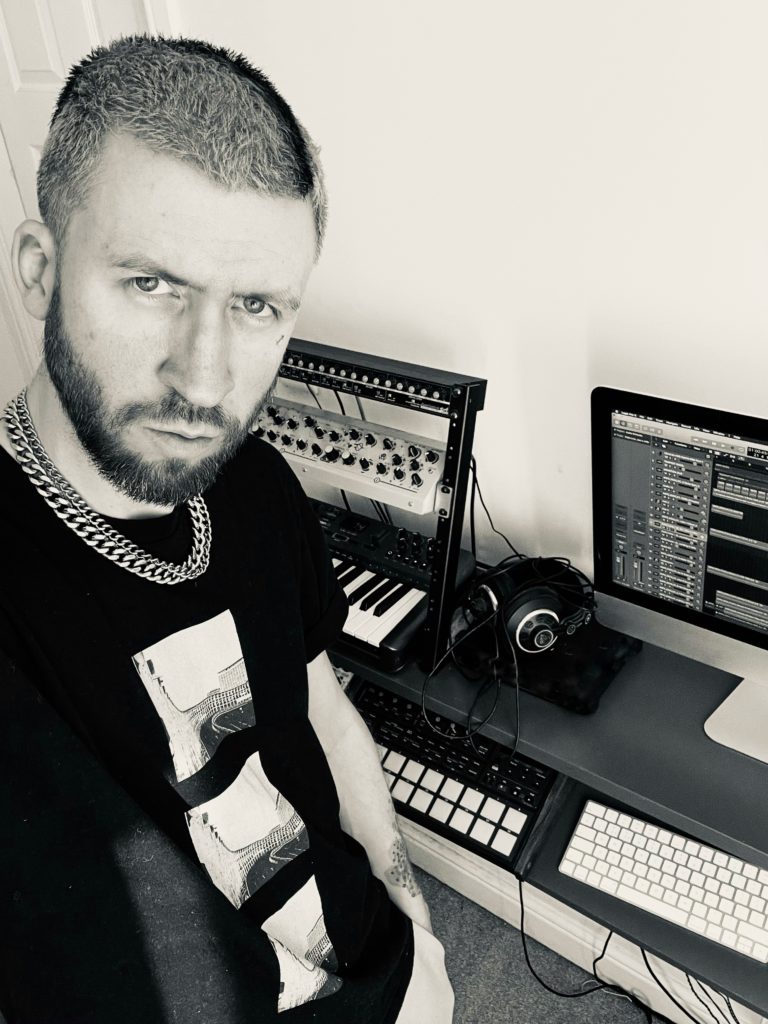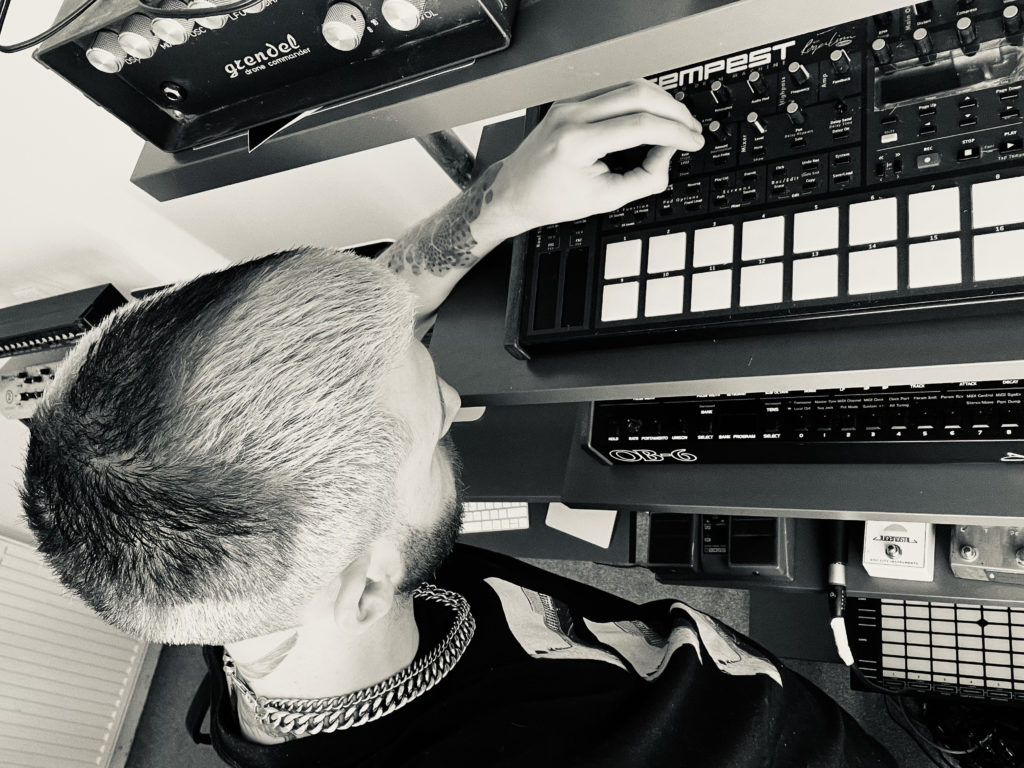Artist Tips: Samuel Kerridge
Tips for success from the renegade British producer.

Artist Tips: Samuel Kerridge
Tips for success from the renegade British producer.
For more than a decade, British producer Samuel Kerridge has been carefully turning techno inside-out. Through his releases on labels including Blueprint, Contort, and Regis’ Downwards, where he’s found a home, Kerridge has earned himself a reputation as an outlier, a renegade producer who dismantles any preconceived notions of electronic music, placing them in an incinerator before piecing it all back together in unorthodox, but highly rewarding, way.
It’s an approach towards making music that dates back to to his childhood, which he spent exploring unlicensed raves and record stores, journeying through house, jungle, drum & bass, and experimental rock to the noise-infused soundscapes in which he currently operates. His music is powerful and brutalist, and built to challenge its listeners, and we thought it was about time that we learned a little bit about his thinking behind it. (For more information on Kerridge, check out his XLR8R podcast here.)
Don’t Lose Sight of the Bigger Picture
You might’ve seen me bang a drum, play a keyboard, or strum a guitar on stage but I’d get laughed out of any music school. I don’t know how to play any musical instrument in the traditional sense and I’d have more of a chance understanding braille than reading sheet music. But I don’t think any of that is important. This stuff can’t teach you soul and that’s the point of art. To come from an inner sanctum, to let your muse inhabit you. This is something that can’t be attained via any school or university.
In a strange way I think that it helps me because I don’t get bogged down in the details of anything I am making. My music is all about trying to formulate an idea in sound and I must protect that idea at all costs. I must cherish it. That means I have to keep that idea as fresh and clearly defined in my head as possible. This is the main element of the track. In most cases it’s a melody or a bass sound. (I don’t think I’ve ever started a track with a kick drum.)
I guess subconsciously I can see or feel this element at the beginning of any piece that I’m working on. I can feel instantly when I’m in that moment, when I’m working towards realising that idea, and it feels great.
I always try to record the framework for it as quickly as possible. One creative idea will usually lead into another, and then another. So I’ll save those core elements as individual tracks, and then keep exploring further, sticking at it until I’ve reached my limit. This process also allows me to sit on a track for a while before carving out its future. I’ll spend hours each day listening to that original idea, sometimes across many weeks or more, completely succumbing to its presence and letting it feed into me.
Part of protecting this idea, however, is avoiding the temptation of trying to finesse the minor details of the track. Like a kick drum or a hi-hat. There has to be a core structure to the track, it is the main element driving that inspiration, but the parts branching off that don’t need hours spent on them, yet!
Because if I focus too much on those I will lose sight of the original idea. So what I’ll do is either jot those ideas down quickly using whatever equipment is at hand, or make some notes in Logic and revisit them at a later date once that main source of inspiration is properly fleshed out.
It isn’t always easy to do this, because in certain aspects of my life I am a perfectionist. I’ve made mistakes and they tend to eat me up. There have been countless times where I’ve had this great idea for a track and I’ve spent hours in the studio looking for a particular sound, but in doing so I’ve lost the creative buzz and the track feels flat and ill defined.
I can think of several examples where I’ve had this great idea for a track but in the studio I’ve spent hours looking for a particular sound, and in doing so I’ve lost the creative buzz and the track feels flat and ill defined.
With all this in mind I actually find it helpful to limit my time in the studio. More is not always more.
I know I am most productive in the morning, so I’m normally working from around 9 am until the early afternoon. These are the only hours when I really get creative work done. If I push the time further it becomes administrative work, and my inspiration dissipates. It can feel like you’re being productive but the next day it turns out you’re not; creativity isn’t something you can rush.
When I am in that moment I constantly tell myself to keep focused on what’s important. To avoid spending hours getting those hi-hats sounding right because that’s not how I make my best music. That’s not the message I am trying to promote. There’s a different picture and I must stay true to that.
Really, it comes down to perspective. I also think it’s especially important for the kind of music I produce. When you’re making business techno, or DJ tools, it’s not so much about the musicality, and those finer details are perhaps the only thing giving your track definition and character. I’m trying to do something more personal. The technical side of things, like whether a kick drum is tuned perfectly isn’t something I am so bothered about. I am more interested in the soul and message.
Always Trust Your Instinct
In 2014, I put out a track called “Paint if Black” on Blueprint. It’s a broken beat track with a whole load of bass on it. When I was making it I distinctly remember I began to overthink.
One of the reasons this happened was because I was trying to second guess what the label would want. I was thinking: “Maybe this needs to be more techno.” I ended up making all these different variations with a 4/4 kick drum and James Ruskin at Blueprint had the EP ready for release. But a week later when I listened to it with fresh ears I realised we needed to go back to the original version, which we did, thankfully.
Instances like that have taught me to always stick to my gut instinct if I want originality. Like I said, I have this feeling deep inside for where my music should go and what it should represent and it’s easy to erode that if you begin changing your sound or style based on what other people might say or think.
Looking back on that Blueprint release, the process I went through still haunts me and it’s made me realise that authenticity is the most precious thing I have as an artist. It’s me who has to look at myself in the mirror and I want to be proud of that.
My guiding light is always going to be my ears and gut, and I roll with it. I’ve claimed in interviews in the past that “I really don’t give a fuck what anybody thinks,” which is a statement lacking in maturity, but it’s still true.
There’s nothing more upsetting for me than when an artist has built this really good career to a point and then they take a turn because of outside influences. It repulses me a bit. I can’t do that.
To help me stay authentic I remind myself that I am creating art. Evoking a strong emotion is what I value. But you can’t make true art whilst vying for acceptance and validation.
You can hear when an artist isn’t being true to themselves. Sometimes they can’t see it, trapped in their echo chamber, but it’s clear; it becomes business and there’s no soul. In the end you’re creating music for a purpose; it’s a tool that goes well with a line of pub grub. It is not art.
The way I look at it is that I’m going on this journey and if there are people who want to join me on it then that’s great. But I’m not going to change to try to find more people or appease anyone else.
It’s important to be aware of where these pressures are coming from. It might be a manager telling you to accept this booking request or to make an EP that’s more dancefloor-orientated in order to get more bookings. Or even your friends and family.
From a business perspective there have definitely been times where I’ve been tempted to override my gut. There have been opportunities presented to me that have certainly made me ask a lot of questions, especially when I’ve been struggling to pay rent, but like I said I just can’t do it. It goes against everything I stand for. You might have lots of money in the bank or a heavy touring schedule but that’s not what makes me happy in life. Having a son has validated that. It’s originality that I strive for. What it is that you value?

Burn Your Manuals
I have never read a manual for any musical instrument I’ve owned. I’m a big believer that reading manuals for instruments sucks the fun right out of the music making process. Music making needs to be based on freedom!
The only machines that stay in my studio are those I can use intuitively. Like the Dave Smith Instruments OB6 or the Pioneer Toraiz SP-16 Drum Machine in my live performances. With both of these machines the workflow is so easy. This enables me to experiment because I am not getting bogged down in menu diving. If the piece of equipment is basic I find that I work harder to find unique sounds.
I also value happy accidents.
When you don’t know how to use a piece of equipment how it was intended to be used, you get all these really cool happy accidents. You’re bastardising the equipment and that is exciting to me. I think that’s when you start to discover sounds that other people won’t and a common question I get asked is: “How the fuck did you manage that?: It’s all about putting different equipment in the signal chain. Gear that is not meant to be there, exploring the process. In the end you make it work!
I think this links back to my DIY background. I’ve always felt aligned with the whole punk scene of the ‘70s. Working class heroes picking up instruments and having a go. Most of the time coming up with extraordinary results that stand the test of time; that is such a romantic idea to me. It’s that kick back, tearing up the rule book, finding your own path and pulling it off. It is true art of the highest order; pure authenticity. That’s what I aim for in my own music and what I seek from others. I’ve somehow blagged it for 11 years now, some may argue to what success, but I’ve done it my way!
It’s also a matter of timing. I’m a parent now and that limits my time. I’m not sure an afternoon in the studio trying to program a sequencer for hours is the best utilisation of that time. You could spend four hours reading the manual learning how the machine is supposed to be used or you could spend those four hours using it incorrectly and in the end finding a whole array of things you never knew you wanted. Plus, you’re exploring the machine and its workflow at the same time. Everyone works differently, and no either way is right or wrong, I just try to cut out as many obstacles to my artistic expression as possible.
I like to pick gear up and immediately start playing with it right out of the box. If it’s not clicking, because it’s too intricate, I get turned off and I’ll never pick it up again.
A lot of manufacturer videos produce a great advert, that’s their job, but the reality tends to be very different in the studio. That initial excitement of opening up a new piece of gear soon dissipates when I realise the machine isn’t capable of what I thought.
I’ve had to sell loads of hardware because the learning curve is just too great, taking time away from actually writing music.
I’m wary of naming individual machines by name, but there’s some equipment I’ve had, like the Squarp Instruments Pyramid sequencer, that is too complicated and long winded for me. On paper I was sold; it looked fantastic, exactly what I wanted to do, but in reality it definitely was not intuitive. It didn’t feel natural at all.
Everyone was banging on about the Elektron Octatrack years ago and I tried it and thought it was shit. What’s mental is that I went and bought the Dave Smith Tempest Analogue Drum Machine which is one of the most complicated machines out there but somehow it kind of works for me. I still don’t know how to use it by the book but it works how I want it to work. I get what I want out of it.
Still today, that’s the only machine I’ve ever taken the time to learn. I’ve had so much patience for it; obviously a greater power knew what that machine had in store for me. It has been used extensively on my records since 2016 and I can’t envisage letting it go!

Always Listen to Advice—But Be Careful
I’ve picked up various studio tips over the years through collaborations and overheard conversations, and I think that’s really important. I don’t think I know it all, because I definitely do not, and for this reason I am always open to technical advice. In fact, I search for it, and I think everyone should. It can really help you to evolve your sound.
Most of the advice I’ve picked up has been quite basic, a lot relating to EQ in regards to cutting certain frequencies and clashing. My music has always used the full spectrum of the frequency range, so as my sound has developed I’ve become more tuned in to giving sounds their own space within that spectrum.
More tips have been gained from earwigging sound engineers or fellow artists. Juan Mendez (a.k.a Silent Servant) encouraged me to use my own vocals in those first few years and gave me the confidence to do that, and Russell Haswell guided me early on, for example on the importance of putting kicks and bass in mono. This is basic knowledge to a lot of engineers, but being self taught I didn’t know any different.
In those early days I’d chuck pretty much everything in stereo, for instance on “In and Out,” “Auditory System,” and “Waiting for Love 1.” Those little nuggets of information have enabled me to progress musically and given me a deeper understanding technically. It’s made me a better artist.
In hindsight all of those tracks could be better balanced but they all form part of my story as an artist and there’s pure beauty in that. I would never go over old ground and work on these tracks again. I’m not embarrassed by them, the complete opposite; I’m proud of all my work. There’s nothing to correct about them, they are integral to my history.
My first EP is riddled and dripping in distortion and reverb. Yet following any other process wouldn’t have got those specific results and to this day that EP is one of my favourites. That sound was specifically what I was trying to attain: washed out, filthy, dragged through a disused mill. It led me on to exploring a cleaner, direct sound as heard on my later work. Because as things have evolved I’ve tried to show a side of my work with more restraint as can be heard on Possession Control. Toning down those outlandish reverbs for a cleaner, refined sound. I still use all methods, but it’s completely dependent on where my head is at and what I need to achieve.
It is, though, important to emphasize “technical” advice here, because I’m not open to all advice. Be careful! I specifically don’t think you should be open to other people’s advice on what direction you should be heading musically. That’s a different ball game and not something I entertain in my own work in any shape or form. It’s your art and your vision, and that gets compromised once you start taking other opinions into account.
As I said earlier, other people will have different motives for why they want you to go in a certain direction. There’s been so many examples of artists who have been pushed down routes and they’re not happy. Because you’re then going into the process with preset formulas. You’ll follow certain workflows and practices to get certain results. Don’t be a robot.
It’s my uncompromising belief and single mindedness that helps me block out any outside noise. Of course people will always form their own opinions, and they’re entitled to them, but some strange humans will think you want to hear all about it. Whether you choose to massage their ego or piss in their pint is your call.
I’ve been fortunate to be on Downwards with Karl O’Connor (a.k.a Regis). I’ve sent him half-finished demos and he’s taken what I do with no questions asked, pure faith from the start. It’s important to find a label with that belief in you, to see exactly what you’re about without needing the polished studio version of yourself. They are buying into you as a whole package. If they can’t see past a dodgy demo and envisage the bigger picture, fuck them.

Be Patient and Have Faith
If you’ve reached this point of the article without Tweeting insults at me, I salute you! Brothers and sisters in arms!
However, I will assume some of you reading this might be perplexed that as a professional I should perhaps invest the time into learning or changing some of these things……but why?
The old adage of “if it’s not broken don’t fix it” fits appropriately here. If I’m content with my sound, whatever the means of getting to that point makes no difference whatsoever. And in reality there’s never anything I want to do that I can’t. Sure, I can’t belt out a Hendrix riff or recite some Beethoven but I’ve never wanted to.
None of this means I take it any less seriously than anyone else. I prepare thoroughly, I love what I do, and feel fortunate to be able to show the world my sound. How profound that is will never be lost on me.
What I’m trying to convey, and I hope it’s clear to all who are reading this, is that nothing in this field is unattainable. If you want to go to college or university and learn music that’s fine, I’m not attacking anyone else’s approach, but anyone reading this and feeling like their dreams are out of reach because they don’t fit certain criteria either financially, academically, or socially, think on! My message to you is beg, steal, or borrow what equipment you can, and get to work making the album we all need to hear!
I’ve never had any doubt in my sound; the belief I hold is unwavering, perhaps it is misguided, but I’m blinded by my own desires to speak my language. The most surprising thing for me at the beginning of my career was the fact there was an audience ready to join my fight. Of course there have been ups and downs along the way, and currently the scene feels far removed from anything challenging the status quo, but music comes in cycles, so be patient and bide your time.
There’s no need to force it or get frustrated that no one is listening. Trends change but true quality is timeless and the right audience will seek you out. Position yourself correctly, make yourself heard, and be true. Most recently artists are measured by streaming numbers, luckily in the beginning of my career that wasn’t something I had to contend with, but is that a true measure of art?
Believe that your time will come. Or perhaps it won’t in your lifetime and you might be huge when you’re dead. Does that matter? No. You’re making this for yourself, not to get plaudits and fame and some social media hype. Hopefully you’ll have an army following you, or maybe it’ll be just your mum and dad in your shed, but if you manage to keep that unshakable faith in your art you’re a fucking success! Rest in peace.
For more information on Samuel Kerridge, check out his XLR8R podcast here.
All photos: Artist’s own
Kerridge’s Tour Dates
Madrid, Spain • 8th Dec 2023
A Coruna, Spain • 9th Dec 2023
Glasgow, UK • 15th Dec 2023
Barcelona, Spain • 16th Dec 2023
Hong Kong, China• 19th Jan 2024
Shenzen, China • 20th Jan 2024
Hangzhou, China • 26th Jan 2024
Shanghai, China • 27th Jan 2024
Support Independent Media
Music, in-depth features, artist content (sample packs, project files, mix downloads), news, and art, for only $3.99/month.

